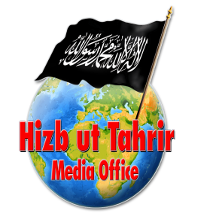Media Office
Wilayah Afghanistan
| H. 18 Dhu al-Hijjah 1445 | No: Afg. 1445 / 30 |
| M. Monday, 24 June 2024 |
Press Release
The Ruling Regime's Approach to Mines Extraction Strengthens Muharib (Hostile) States and Weakens the Muslims of Afghanistan
The Ministry of Mines and Petroleum of Afghanistan has declared that over the past two and a half years, more than seven billion dollars have been invested in the mining sector in Afghanistan. In this process, besides domestic companies, companies from Qatar, Turkey, Russia, Iran, China, and the United Kingdom have also played a significant role. This is considered the largest investment in mining in the history of Afghanistan.
The Media Office of Hizb ut Tahrir in Wilayah Afghanistan deem the following essential points concerning this issue noteworthy:
First, Afghanistan's mines are public property. The Messenger of Allah (peace be upon him) has stated: «الْمُسْلِمُونَ شُرَكَاءُ فِي ثَلَاثٍ الْمَاءِ وَالْكَلَإِ وَالنَّارِ»“Muslims share three things together: water, pastures, and fire.” In this Hadith, the term "fire" is referred to as fuel, energy and its derivatives. Thus, the Shariah has allowed all individuals in society to benefit public property. For instance, all Muslims have share in the oil of Saudi Arabia, the gas of Qatar, and the mines of Afghanistan. Therefore, any regime that controls the mines of the Muslim Ummah is obligated to proceed with extraction and utilization based on Shariah principles. The Shariah principle instructs that mines should not serve as a source of income for ordinary and developmental state budgets, except for parts that pertain to the collective welfare of the Muslims. Furthermore, it is not permissible from a Shariah perspective to hand over large and strategic mines to private companies. Instead, the Islamic state is responsible for the extraction of mines on behalf of the people, and the profits obtained from it should be entirely spent on public welfare and public services. This ruling applies to all types of public properties, whether it involves mining, extraction, refinement, production, or distribution. Therefore, the current process of contracting out large and strategic mines to private companies is an illegitimate procedure and politically fraught with dangerous consequences.
Second, Afghanistan is a land rich in valuable and diverse natural resources. Currently, China, Russia, and the United States have not only been eyeing on Afghanistan's natural resources but also striving either to exploit these mines for their own benefit or to prevent their rivals from accessing Afghanistan's strategic mines. Additionally, these countries use mining companies as a cover to advance their political and intelligence objectives. Since the extraction of Afghanistan's mines can play a significant role in the global energy transition and micro-chip production process, major powers have watchful eyes for Afghanistan's strategic mines and the process of contracting rare elements. Gaining access to these can tip the balance in the global geopolitical game in favor of one of the powers. Hence, it is imperative for rulers to manage Afghanistan's mines in a way that does not strengthen the economy and industry of hostile states.
Third, the current process of exploration, extraction, processing, and auction of mineral resources lacks a transparent and cohesive mechanism, and some influential officials in the ruling regime play critical role in the contracts and exploitation. Continuing this process has subjected Afghanistan to the "resource curse," turning it into a means of political strife and competition among foreign countries and internal factions. The "resource curse" is a condition where instead of economic growth and stability, mineral resources lead to poverty, misery, and violence. Signs of this dangerous dynamics are already seen. Even if the ruling regime earns billions of dollars from mining, it will still not be able to transform into a wealthy, productive state but will remain a consuming state.
Fourth, the experience of countries shows that mismanagement of mineral resources paves the way for instability.
Afghanistan can only escape the "resource curse" through a system that manages mineral resources based on Islamic thoughts and rules, as Allah Almighty says regarding the importance and use of mineral resources:
[وَأَنزَلْنَا الْحَدِيدَ فِيهِ بَأْسٌ شَدِيدٌ وَمَنَافِعُ لِلنَّاسِ وَلِيَعْلَمَ اللَّهُ مَن يَنصُرُهُ وَرُسُلَهُ بِالْغَيْبِ ۚ إِنَّ اللَّهَ قَوِيٌّ عَزِيزٌ]
“And We sent down iron with its great might, benefits for humanity, and means for Allah to prove who ˹is willing to˺ stand up for Him and His messengers without seeing Him. Surely Allah is All-Powerful, Almighty.”[Al-Hadid:25].
Reflecting on this blessed verse, it becomes clear that from the perspective of Islam, mineral resources should be used for two primary purposes. 1) using minerals for armed mobilization to give Nussrah (implementation and proclamation) of Allah's Deen and 2) using minerals to meet human needs and benefits.
Therefore, any effort to extract and utilize minerals that is not based on Shariah rulings, piety, and profound political insight will not help to secure the welfare of the people but will become a means of instability and influence of powerful countries. While mineral resources are a blessing that Allah (swt) has bestowed upon a nation; therefore, these resources should be effectively and lawfully used for the benefit of the people, and most importantly, to lay the foundation for an industrial state with advanced military technology aimed at comprehensively implementing Islam and carrying the message of Islam to other nations through Dawah and Jihad.
Media Office of Hizb ut Tahrir
in Wilayah Afghanistan
| Hizb-ut Tahrir: Media office Wilayah Afghanistan |
Address & Website Tel: http://hizb-afghanistan.org/ |
E-Mail: info@hizb-afghanistan.org |





